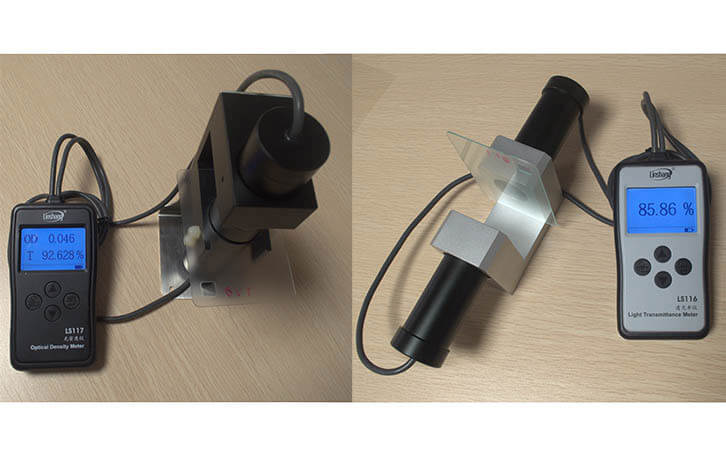Transmittance Meter | Frosted Glass Transmittance Test
Frosted glass is also called dark glass. It is made of ordinary flat glass by mechanical sandblasting, manual grinding (such as emery grinding) or chemical treatment (such as hydrofluoric acid dissolution), etc. to treat the surface into rough and uneven translucent glass. It is generally used on the doors and windows of offices and bathrooms.
1. So why is frosted glass so popular in the decoration market?
(1) Privacy protection
When we look outside through the frosted glass, we can't see the indoor situation clearly, it gives a very vague feeling. Although it looks blurry from the surface, when you look from the inside out, you can see clearly. And it will not affect the lighting. The lighting in the room is also very good.
(2) Good sound insulation effect
When making sound insulation glass, you can use frosted glass to make it, because frosted glass has a good effect on sound insulation. If you use frosted glass to make sound insulation glass, the sound insulation glass produced is very good. In the production of soundproof glass, frosted glass is often used. But as more glass is produced, frosted glass is replaced by other products.
(3) High degree of safety
Frosted glass is a type of safety glass, which is very safe to use and guarantees personal safety. Glass is a fragile product. After being subjected to external forces, the glass will easily break. If the glass is damaged, it will increase the user's cost. However, frosted glass not only helps us solve the security issues. And the price is relatively low and the use time is relatively long.
(4) Create an atmosphere
Frosted glass has a light-transmitting surface and is not transparent due to its rough surface. This can make the indoor light soft and not dazzling. It can be used in places where a soft atmosphere is needed.
The transmittance of frosted glass is usually around 90% ~ 95%. To know the true light transmittance of frosted glass, it is not enough to see with eyes. We need to use a professional transmittance meter to detect the light transmittance of frosted glass. Linshang LS117 transmittance meter is a special instrument for detecting the transmittance of frosted glass. This transmittance meter uses diffuse reflection principle. Due to the rough surface of the frosted glass, the light is diffusely reflected and transmitted. So the LS117 transmittance meter is suitable for the visible light transmittance measurement of frosted glass. The light is reflected through the frosted glass and is emitted in all directions (because the frosted glass surface is not smooth, which causes diffuse reflection of the light), the refraction on the retina is already an incomplete image, so the things behind the glass cannot be seen. It can soften the indoor light without being dazzling.
If the light transmittance of frosted glass is detected by a general transmittance meter on the market, some light scattered by the light after passing through the glass cannot be received by the instrument using the parallel light path, so the data obtained will be small. If you want to test the transmittance of frosted glass, opal glass and other objects, it is recommended to use Linshang LS117 transmittance meter!
- Linshang Insulated Glass Unit Measuring Tools
- Spectacle lens anti-blue light detection---blue-violet light transmittance meter
- Measurement of Optical Density
- Difference of LS116 Transmission & LS117 OD Meter
- Difference between LS116 and LS117 Light Transmittance Meter
- What’s the Difference Between Point Light and Parallel Light Transmittance Meter
